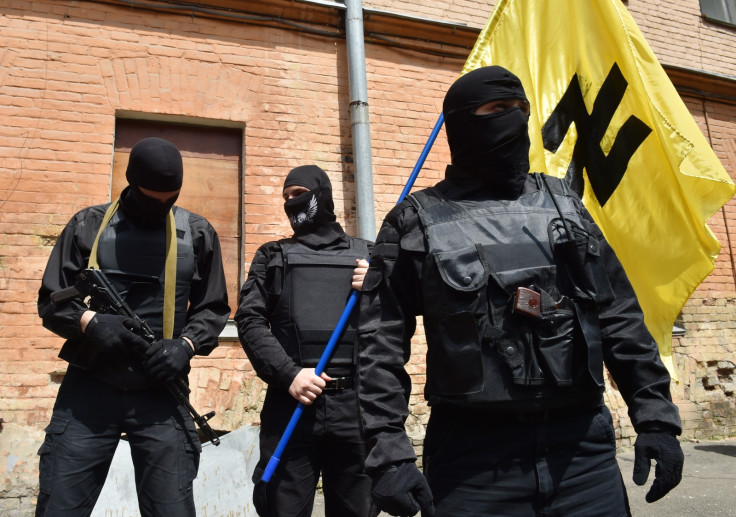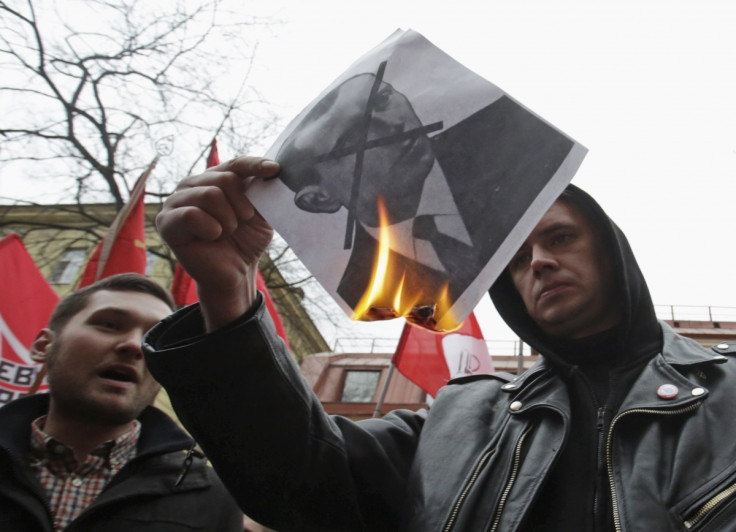Ukraine crisis: Is Ukraine on the verge of a neo-Nazi coup?

When thousands of Ukrainian nationalists gathered in Kiev earlier this week (21 July 2015) to call for the impeachment of the country's president, it marked a new low for relations between the government and the militias with which it has formed an uneasy alliance since the war began.
The rally came just over a week after a deadly gun battle between the army and Right Sector militia fighters in the country's west, during which two were killed, and amid rising anger from nationalists in Ukraine about the perceived weakness of President Petro Poroshenko.
The gun and grenade battle in western Ukraine – far from the frontlines in the Russian-dominated east – was the latest in a number of spats that have seen the Ukrainian army seeking to rein in the militias that have thrived since the war began 18 months ago.
As Ukraine maintains an uneasy peace with the Minsk II Accords, plenty of nationalists in Ukraine feel that Kiev is now willing to see swathes of the east of the country remain ruled by pro-Russian proxies the Donetsk and Luhansk Peoples' Republics.
The presence of far right and neo-Nazi elements in the Ukrainian resistance movement in the east – where both the army and militias were battling pro-Russian separatists in the Donbass – and even in the protest movement that began in Maidan Square in 2014, is extremely contentious in Ukraine, not least because it is the line pushed by Russian President Vladimir Putin.
They are seen as the tough guys that are defending the country. People just want to be with the tough guys.
Putin frequently alleges that the government in Kiev is propped up by neo-Nazi and anti-Semitic fascist groups including Right Sector and Svoboda – a nationalist party that won seats in the Ukrainian parliament in 2012.
Putin uses this fact to justify the annexation of Crimea and the backing of separatist groups in eastern Ukraine.
The sight of thousands of ultra-nationalists marching through Kiev and calling for the downfall of Ukraine's leader will only seek to bolster the Russian view of a Ukraine overrun with neo-Nazi elements, led by controversial Right Sector leader Dmytro Yarosh.
"Right Sector is initiating a nationwide Ukrainian referendum to answer several questions. First, a motion of no-confidence in government; second, we demand for the Russian war against Ukraine to finally be recognised as a war, and not as an antiterrorist operation. Our Ukrainian people must have their word here," said Yarosh.

It doesn't help that at many of these rallies, supporters carry huge posters of wartime Ukrainian militia leader Stepan Bandera, a militia leader that sided with the Nazis against Russia at the tail end of the Second World War and is accused of the massacre of Jews and Poles.
But Bandera is an equally contentious figure in Ukraine. In the Russia-dominated east, he is seen as a Nazi collaborator and an anti-Semite. In the west, close to Poland, he is equally unpopular. But among Ukrainian nationalists, he is seen as a freedom fighter who fought for his dream of a "Greater Ukraine" against the murderous regime of Joseph Stalin.
The parallels between perceptions of Bandera and views of the Right Sector and other groups in today's conflict are striking. Ultra-nationalists in Ukraine have always been anti-Russian, but the war has seen anti-Russia sentiment become mainstream in the country.
As a result, Ukrainians have been willing to tolerate some of the Right Sector's less conventional – or openly fascist – views in return for their opposition to Russian expansion in the east. Like Bandera, many Ukrainians are willing to overlook some of the group's transgressions or ideological positions in return for their willingness to fight for Ukraine.
Andreas Umland, senior research fellow at the Institute for Euro-Atlantic Cooperation in Kiev, said that while the leaders of the far-right militias tended to come from an ultra-nationalist background, those joining them were not necessarily neo-Nazis, and indeed some may even be on the left. Right Sector attracts those who want to fight Russia across the political spectrum.
"They are seen as the tough guys that are defending the country. People are not interested in their ideology or what is behind it, they just want to be with the tough guys," he said.
Is there a worry therefore that the war will allow a far-right movement to sneak into power on the back of a conflict? Umland thinks not. He points out that the ultra-nationalists only secured a tiny amount of votes in the latest election, and even at their strongest only represent a few thousand Ukrainians in a country of 45 million people.
Equally, he said, with the gun battles in the west and the rallies in Kiev, Right Sector may be pushing its luck with the Ukrainian public.
"The tolerance that they have in Ukraine is built on the silent agreement that they will behave and that they will not turn against the government, which is why recent events are problematic for them," he said.
© Copyright IBTimes 2025. All rights reserved.






















